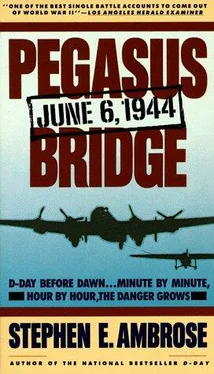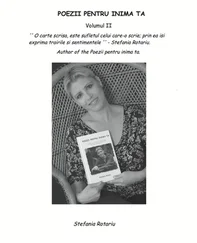Stephen Ambrose - Pegasus Bridge
Здесь есть возможность читать онлайн «Stephen Ambrose - Pegasus Bridge» весь текст электронной книги совершенно бесплатно (целиком полную версию без сокращений). В некоторых случаях можно слушать аудио, скачать через торрент в формате fb2 и присутствует краткое содержание. Жанр: История, на английском языке. Описание произведения, (предисловие) а так же отзывы посетителей доступны на портале библиотеки ЛибКат.
- Название:Pegasus Bridge
- Автор:
- Жанр:
- Год:неизвестен
- ISBN:нет данных
- Рейтинг книги:5 / 5. Голосов: 1
-
Избранное:Добавить в избранное
- Отзывы:
-
Ваша оценка:
- 100
- 1
- 2
- 3
- 4
- 5
Pegasus Bridge: краткое содержание, описание и аннотация
Предлагаем к чтению аннотацию, описание, краткое содержание или предисловие (зависит от того, что написал сам автор книги «Pegasus Bridge»). Если вы не нашли необходимую информацию о книге — напишите в комментариях, мы постараемся отыскать её.
Pegasus Bridge — читать онлайн бесплатно полную книгу (весь текст) целиком
Ниже представлен текст книги, разбитый по страницам. Система сохранения места последней прочитанной страницы, позволяет с удобством читать онлайн бесплатно книгу «Pegasus Bridge», без необходимости каждый раз заново искать на чём Вы остановились. Поставьте закладку, и сможете в любой момент перейти на страницу, на которой закончили чтение.
Интервал:
Закладка:
It was worse for Joy. She got a telegram from the War Office which was supposed to read, 'Your husband has suffered a mortar wound and is in hospital'. In fact it read, 'Your husband has suffered a mortal wound and is in hospital'. A frantic Joy was told that he was in such-and-such hospital. She called there and was told he never arrived. No one knew where he was. For two weeks before the matter was worked out, and they started receiving letters from each other again, John and Joy suffered terribly.
Sergeant Hickman was fighting across from D Company once again. He gives a description of what it was like from the German point of view:
There was man-to-man fighting, fighting in the rubble along the streets. You didn't know who was running in front of you and who was running behind you, you couldn't recognise anything and everybody ran. In the daytime we took position, and night we moved either to the left, to the right, back. I had a map case in my belt. The map made no difference to me because I didn't know where I was. So you were moved two kilometres to the left, two kilometres to the right, three kilometres forwards, or back again. Every day you counted your men, one section had two men left, another three. I was a platoon commander with five men to command.
On September 2, while trying to swim the Orne River, Hickman was wounded, captured, interrogated, and sent on to a POW camp in England.
Von Luck was also having a bad time. Every two or three days he would launch armoured attacks, but every time his tanks moved, observers in balloons would spot him, radio to the big ships offshore and the planes overhead, and down would come naval gunfire and strafing Spitfires.
On July 18, there was the biggest bombardment von Luck ever experienced, from bombers, naval warships, and artillery. This was part of operation Goodwood, designed to break through the German lines, capture Caen, and drive on towards Paris. As the barrage moved past him, von Luck set out for the front on his motorcycle. He arrived at a battery of smoking 88mm guns pointing skyward, commanded by a Luftwaffe major. Off to his right, less than a kilometre away, von Luck could see twenty-five British tanks moving forward. He pointed them out to the battery commander and said, 'Major, depress your guns and kill those tanks'. The major refused. He said he was a Luftwaffe officer, and his target was bombers, not tanks. Von Luck repeated his order. Same response.
Von Luck pulled his pistol, pointed it between the major's eyes at a six-inch range, and said, 'Major, in one minute you are either a dead man or you will have won a medal'. The major depressed his guns, started shooting, and within minutes had crippled twenty-five British tanks. Shortly thereafter, Monty called off operation Goodwood.
In late August, 21st Panzer Division was pulled out of the Normandy battle. Von Luck and his men were sent over to the Rhone Valley to meet the threat of the invading forces in southern France.
At the end of August the British broke through and had the Germans on the run. D Company was part of the pursuit. It reached a village near the Seine, where Howard established his headquarters in a school and received the schoolmaster. The Frenchman said he wanted to show some appreciation for being liberated. 'But I've got nothing of any value that I can give you', he confessed to Howard. 'The Germans took everything of value before they left, in prams and God knows what, but the one thing I can give you is my daughter.'
And bringing out his eighteen-year-old daughter, he offered her to Howard. 'It was so pathetic', Howard remembers. He declined, but he also thinks the schoolmaster passed his daughter on down to the other ranks - and that they accepted the gift.
The following day, on the Seine itself, Howard came into a village 'where we saw all these girls with all their hair cut off and tied to a lamp post. It was a gruesome sight, really.' He wondered if that kind of humiliation was being handed out to the prostitutes back in Benouville, who had been as eager to please the British troops as they had the Germans. Or to the young mothers in the maternity hospital. Whose babies could those be, anyway, with all able -bodied Frenchmen off in slave labour or POW camps?
Howard thought it unfair of the French to take out all their frustrations on a single segment of society. Almost everyone in France had got through the German occupation by doing whatever it was that he or she did quietly and without a fuss. One of the things young girls do is establish romantic attachments with young boys, and there were only young German boys around. The girls had no choice, but to Howard's dismay they had to bear the brunt of the first release of pent-up outrage following the liberation celebration. Those Frenchmen with guilty consciences did most of the hair cutting.
On September 5, after three months of continuous combat, D Company was withdrawn from the lines. It travelled by truck to Arromanches, was driven out to Mulberry Harbour, climbed up scramble nets aboard ships, and set sail for Portsmouth. Then by truck to Bulford, where the members of the company moved back into their old rooms and took stock of their losses. Howard was the only officer still with them. All the sergeants and most of the corporals were gone. D Company had fallen from its D-Day strength of 181 to 40.
CHAPTER TEN
D-Day plus three months to D-Day plus forty years
After one night at Bulford, the company went on leave. Howard drove up to Oxford for a reunion with his family and a glorious rest. On the morning of September 17, he relates, T got up and saw all these planes milling around with gliders on them, and of course I knew that something was on'. The planes were headed for Arnhem. Howard knew that Jim Wallwork and the other pilots were up there, and he silently wished him good luck.
Howard did not know it, but Sergeant Thornton was also up there, with a stick of paratroopers. When Thornton was evacuated from Normandy, he had a quick recovery from his wound. Then, rather than wait for the Ox and Bucks to return, he had transferred to the 1st Airborne Division, gone through his jump training, and was going in with Colonel John Frost's 2nd Battalion. Thornton fought beside Frost at Arnhem bridge for four days, and was captured with him.
Howard could hardly imagine such a thing, but none of those gliders overhead carried coup de main parties, not for the bridge at Arnhem, nor the one at Nijmegen. It seems possible that had D Company been available, someone would have thought to lay on coup de main parties for the bridges. If they had been there to take the bridge at Nijmegen, the American paratroopers would not have had to fight a desperate battle for it. Rather, they could have set up a defensive perimeter, with the strength to spare to send men over to Arnhem to help out. At Arnhem, with glider help, Frost could have held both ends of his bridge, greatly simplifying his problems.
But it was not to be. D Company had not been pulled out of Normandy until it was an exhausted, battered, remnant of its old self, and evidently no other company could take its place. Certainly there were no coup de main parties in the gliders over Howard's head. He watched them straighten out and then head east, and he again wished them good luck.
In late September, 1944, ten days after Arnhem, Howard reported back to Bulford and set out to rebuild D Company, brought up to full strength by reinforcements. Howard's job was to make the recruits into genuine airborne soldiers. He started with basics - physical and weapon training. By mid-November, he was ready to take the recruits on street-fighting exercises, to get his men accustomed to live ammunition. He selected an area of Birmingham, arranged for bunks for the men, and returned to Bulford.
Читать дальшеИнтервал:
Закладка:
Похожие книги на «Pegasus Bridge»
Представляем Вашему вниманию похожие книги на «Pegasus Bridge» списком для выбора. Мы отобрали схожую по названию и смыслу литературу в надежде предоставить читателям больше вариантов отыскать новые, интересные, ещё непрочитанные произведения.
Обсуждение, отзывы о книге «Pegasus Bridge» и просто собственные мнения читателей. Оставьте ваши комментарии, напишите, что Вы думаете о произведении, его смысле или главных героях. Укажите что конкретно понравилось, а что нет, и почему Вы так считаете.




![Stephen Ambrose - Citizen Soldiers [Condensed]](/books/346737/stephen-ambrose-citizen-soldiers-condensed-thumb.webp)




